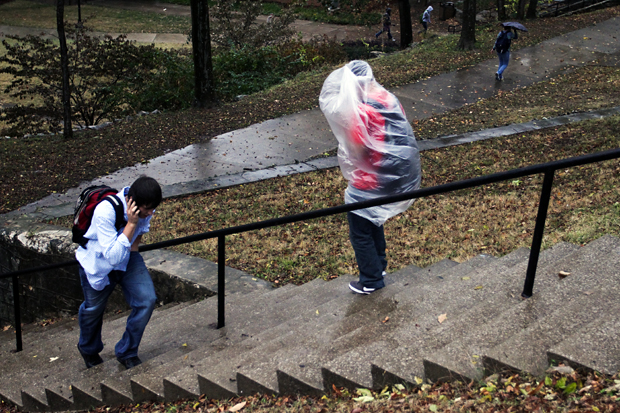Tornado warnings prompt concerns
October 29, 2010
Gabby Yokaris, a sophomore from Peachtree City, Ga., didn’t know what to do on Tuesday.
“I heard sirens,” Yokaris said. “There were people yelling.”
During the storm that swept through Bowling Green earlier this week, which produced tornado and severe thunderstorm warnings, Yokaris was told to evacuate the second floor of Grise Hall.
Once on the first floor, Yokaris said she was asked to move to the middle of the hallway and stay until the storm passed through.
But many students left, she said.
“It wasn’t like high school where everyone stays in the hallway and puts a book over their head,” Yokaris said.
There is no way to make students stay, said Robert Dietle, head of the history department and Cherry Hall building coordinator.
Dietle said his job as building coordinator is to help faculty and students out of the classrooms during emergency situations.
“At 10 a.m., I heard the alarm sound, and by the time I was in the hallway, classes had begun to file down to the basement of Cherry,” Dietle said.
There was confusion, though, during the evacuation process, he said.
“This underscored how we need to get clearer and better evacuation plans,” Dietle said.
He said there was also confusion regarding the outside alarm and WKU Alert systems.
The outside alarm had a more urgent tone in finding safety, but the first WKU Alert said to be “ready to seek shelter if needed,” Dietle said.
He said many students weren’t sure which orders to follow.
“This situation gives WKU an opportunity to tighten things up a little bit,” Dietle said.
Deborah Wilkins, chief of staff and general counsel, said that the gray areas between the alarm system and WKU Alerts weren’t problematic enough to cause concern.
“We’re on a college campus,” Wilkins said. “We’re all responsible adults. If we were dealing with grade school students, it may be a little different.”
While some students were unclear of what to do, Scottsville freshman Andrew Salman said he didn’t even receive the first WKU Alert until 12:10 p.m., long after the first warnings.
“If I had not been in class and heard about it, I would’ve been in my ninth-floor dorm room unaware,” Salman said.
Though there wasn’t any major damage produced by the storm, Salman said he could have been in serious danger.
Bob Skipper, director of Media Relations, told WBKO viewers that students should “use their best judgment” when deciding whether or not to attend class.
The decision to cancel classes university-wide is a decision that comes directly from the provost, Skipper said.
When the provost receives information from Public Safety regarding an emergency situation, he then makes the decision to either close the university or delay its opening, said Richard Miller, associate vice president for Academic Affairs.
Those students who didn’t attend class Tuesday won’t be punished, Miller said.
“Academic Affairs will work with the faculty on this,” he said. “Students won’t be penalized since that was a warning we, as an institution, put out.”













